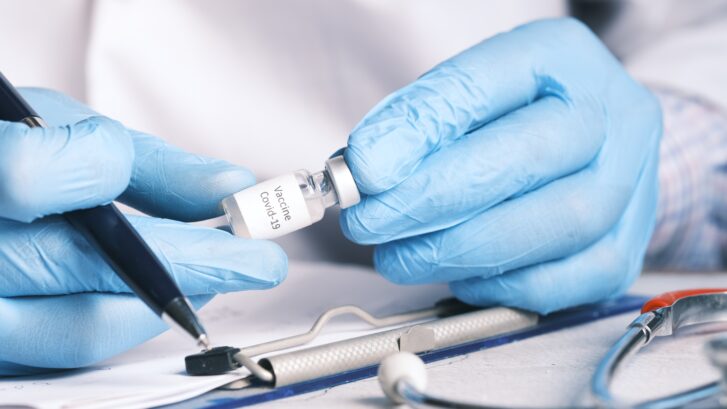Why You Need to Know About Monoclonal Antibodies
In the fight against COVID-19, the top weapon in our arsenal is the vaccine, which has been proven safe and effective. But when people refuse vaccination, or experience a breakthrough infection despite having received the vaccine, one extremely effective treatment is the use of monoclonal antibodies to stave off serious disease.
Our primary care doctors at MD 2.0 in Jupiter are surprised, however, at how few people are aware of this potentially lifesaving treatment. Florida opened a number of clinics where those not sick enough for hospitalization can receive monoclonal antibodies. We want to let you know what this treatment is and what it can do.
What are monoclonal antibodies?
The U.S. Department of Health and Human Services (HHS) explains that your body naturally makes antibodies to fight infection. However, your body may not have antibodies designed to recognize and fight off a novel (or new) virus like SARS-Cov-2, the virus that causes COVID-19.
Monoclonal antibodies, or mAbs, are made in a laboratory to fight a particular infection, in this case, SARS-CoV-2. They are a type of “biotechnology” (a way to modify living organisms for useful purposes) first developed in the 1970s.
Once you’ve infected with the coronavirus or received a vaccine, your body makes antibodies to prevent further infection with COVID-19. This process takes anywhere from one to three weeks.
The laboratory-created proteins in monoclonal antibodies work by mimicking the body’s natural immune system. They can, therefore, offer immediate protection against COVID-19 instead of waiting for the body to mount its own response. This gives the body time to make its own antibodies to fight off the virus.
In most cases, the treatment also prevents further infection of more cells, thus stopping the disease in its tracks.
Dr. Anthony Fauci, the president’s chief medical advisor, said preliminary research shows the drug cocktail can reduce the risk of hospitalization or death from COVID-19 by 70-85 percent.
Who is eligible?
The U.S. Food and Drug Administration (FDA) approved their use for “high risk” patients ages 12 and older exposed to the coronavirus or who recently tested positive.
This high-risk category includes:
- anyone age 65 and older
- those with obesity or who are overweight
- pregnant women
- those with chronic kidney or lung disease (including asthma)
- anyone with cardiovascular disease or hypertension
- anyone with diabetes
- those living with neurodevelopmental disorders
- anyone with sickle cell disease
- the immunocompromised or those who take immunocompromising medication
- anyone with a “medical-related technological dependence” such as a tracheostomy or gastrostomy
Like the vaccine, treatment with monoclonal antibodies is free. You can get the therapy regardless of whether or not you’ve had a coronavirus vaccine. Any eligible individual can receive monoclonal antibodies from an eligible healthcare provider without a prescription.
How the treatment works
It’s important to receive the treatment within the first 10 days of the onset of symptoms, or as soon as you test positive for the coronavirus.
Unlike a quick vaccination, the process of receiving monoclonal antibodies is a comparatively long one. The therapy is administered intravenously over the course of about an hour. Then you must wait an hour for monitoring
Recently, a quicker delivery method comprising four shots, two in the arms and two in the stomach, has been approved. Those who receive the shots vs. the intravenous treatment, though, must still wait an hour for monitoring of any negative reaction.
Amazing results
Many of those who have received the treatment have experienced rapid relief from symptoms.
“I am convinced that monoclonal antibodies saved my dad,” Daniel M. Horn, a primary care physician and assistant professor at Harvard Medical School, wrote in The Washington Post last month.
His father, a 65-year-old anesthesiologist, was weak and lethargic with a high fever, chills, and an “endless” cough caused by COVID-19 before he received the treatment last fall (before any vaccines were available).
“When I spoke to him 48 hours later, I broke down in tears,” wrote Horn. “He sounded like he just had a common cold.”
More recently, his wife’s fully vaccinated 84-year-old grandmother tested positive after she became lethargic, feverish, wheezy, and coughing. Within two days after receiving monoclonal antibodies, “she was feeling so much better that she wondered if the initial [COVID-19] test had been inaccurate.”
What are the risks?
Monoclonal antibodies have been used for years to treat other diseases such as Ebola and Crohn’s disease. Nevertheless, all drugs can cause side effects, and this is one no different.
The National Institutes for Health (NIH) says the therapy may cause several side effects, including:
- mild pain
- bleeding, bruising or soreness of the skin
- swelling
- diarrhea
- fatigue
- nausea
- vomiting
More severe reactions can include:
- thrombotic-type episodes (blood clots)
- arterial hypertension
- changes in heart activity
- slowed bone marrow activity
- impaired renal function
All of the sites administering monoclonal antibodies are open daily from 9 a.m. to 5 p.m. seven days a week. The Florida Department of Health maintains a list of monoclonal antibody treatment sites. You can schedule appointments online.
And even though this treatment has been so successful, it’s quicker, easier, and more effective to get one of the free vaccines. Remember, every time the coronavirus invades a human body, it has the chance to mutate into something that our vaccines and treatments may not work on.

